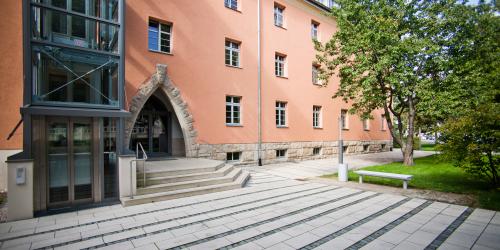
Older people and baby boomers in Jena
Researchers from Kaiserslautern present the results of their survey.
How do people live in Jena? How do they rate their home, their neighborhood, the local offerings and social cohesion? Are there any recognizable differences between the locations in Jena? How willing are older people to move and what are their motives for doing so? And how much do people use digital media as a matter of course? These are questions that the urban sociology team at RPTU Kaiserslautern asked citizens born between 1947 and 1972. The results of the study were presented to the public in Jena on Wednesday.
The study focuses on the so-called "baby boomers" - the age cohort of today's 53- to 67-year-olds who were born during times of high birth rates (the "baby boom") after World War II. This is a large group with different life situations, lifestyles and lifestyles. In the coming years, more and more "baby boomers" will enter retirement age. At the same time, little is known about their housing preferences and demands in terms of (residential) locations, mobility, attitudes and behavior. Prof. Dr. Annette Spellerberg and her team therefore conducted surveys of older adults in seven cities and communities in Germany. The aim was to learn more about the everyday life, housing situation and perceptions of baby boomers and adjacent cohorts.
Martin Berger, treasurer of the city of Jena and coordinator for the Smart Ageing research project at the city of Jena, classifies the survey results: "The presented results with a focus on housing are a first step, more will follow. During the presentation, particular interest was expressed in the topics of health and mobility. There are to be further specialist discussions on this on a smaller scale. In addition to immediate suggestions for improvement resulting from the surveys, the main issue is the development of an IT system to support municipal planning and decision-making. To this end, we as the administration have already supplied a great deal of data from the areas of geoinformation, statistics, social affairs, budgeting, etc. These, together with the survey results, will then form the basis of the system to be selected, which will also be co-supported as part of the Smart City project."
Results of the survey
3,000 questionnaires were sent to randomly selected citizens, 879 and thus 29% of the people contacted participated in the survey by mail or online. This represents a very good response rate, as Annette Spellerberg emphasizes.
Half of the respondents have a (technical) high school diploma, and just over a quarter of the baby boomers surveyed are already retired, accounting for half of all respondents. Two-thirds of the baby boomers report (very) good health.
The majority of the baby boomers surveyed have lived in Jena for a very long time. A good third of the baby boomers have lived in Jena since birth, and slightly more than a quarter moved here after reunification. The most common reason for moving to Jena was their own job, followed by moving in with a partner. Eight out of ten baby boomers and nine out of ten older respondents feel a strong connection to Jena.
Nearly half of the respondents live in property. Among baby boomers, a quarter of owners find the apartment too large, and more than one in ten tenants:in the apartment too small. Overall, satisfaction with the apartment is very high: 9 out of 10 are very satisfied, regardless of age.
Respondents from Jena are more often than average satisfied with the facilities and infrastructures, especially with the adult education center, the libraries, the parks and green spaces, and the cultural offerings. Overall, they are less satisfied with the facilities for seniors and with meeting places (community/civic centers).
Slightly more than one-third of the baby boomers surveyed can imagine moving, and one in ten has specific plans to do so. The main reasons are the desire for a barrier-free apartment suitable for the elderly, proximity to children and an apartment that is too expensive. When it comes to moving in old age, the focus is on independent living in one's own apartment or house and not on special forms of housing.
Smartphones and laptops are standard for the majority of respondents. Around half of all respondents feel (rather) competent in using the Internet and 8 out of 10 agree at least in part that they benefit from digitization. Slightly more than half of all respondents would like to contact public authorities digitally. However, one in six would need support in doing so.
The study is embedded in the research project "Ageing Smart - Designing Spaces Intelligently," for which the city of Jena was selected as one of seven model municipalities. The aim is to support cities and communities in planning and coordinating their services. The research project is funded by the Carl Zeiss Foundation.
Contact:
- Prof. Dr. Annette Spellerberg (Project Management, Department of Urban Sociology, RPTU):
spellerberg@ru.uni-kl.de - Dr. Lynn Schelisch (Project Coordination of the Model Communities, RPTU):
schelisch@ru.uni-kl.de
Website: www.ageing-smart.de
Twitter: @ageing_smart
